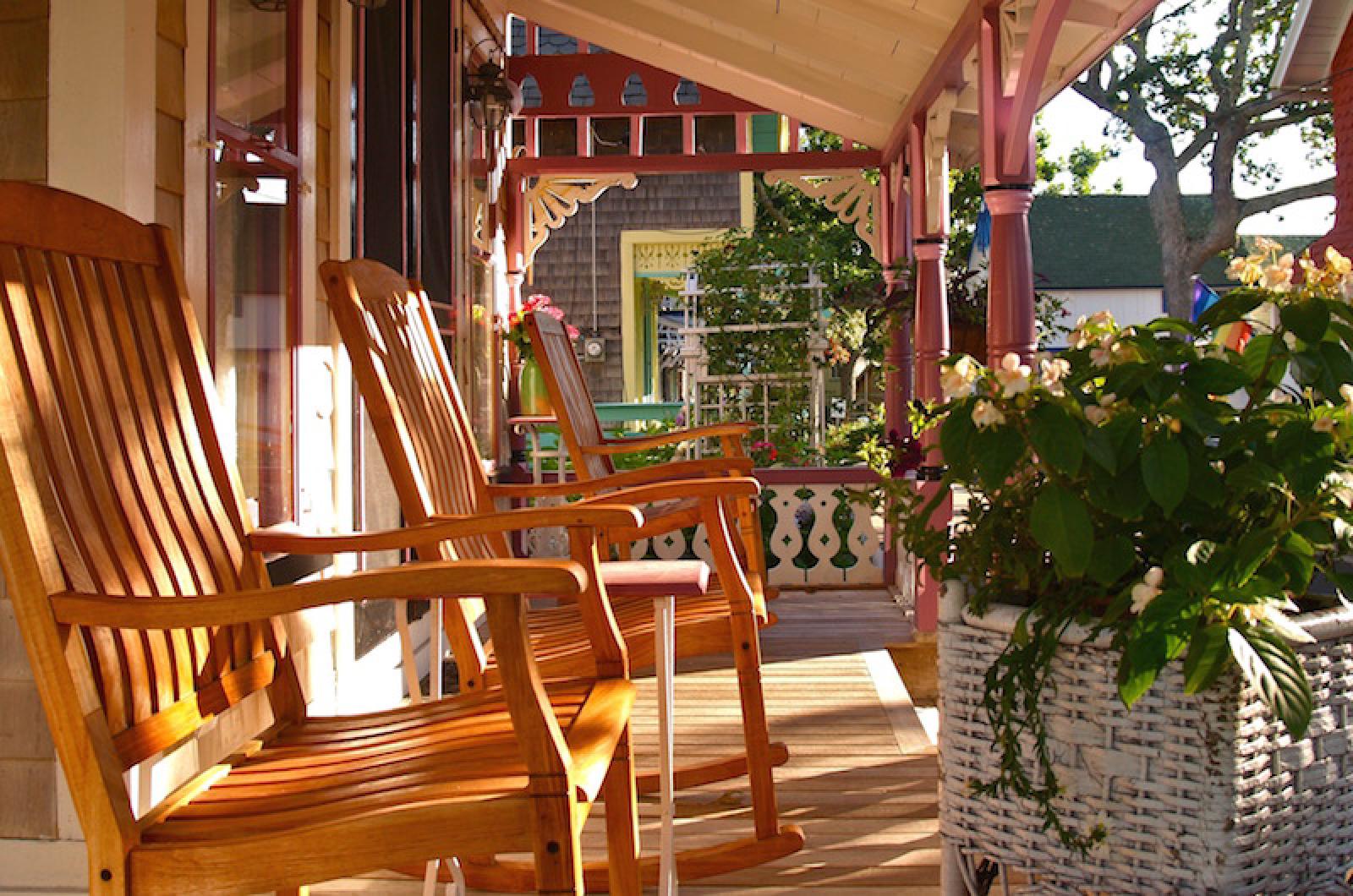Selected essays from Singing in the Morning by Henry Hough.
Gone with the Old Summers
Thirty years ago summer was incomplete without rocking chairs and hammocks. The chairs stood upon the porch of the cottage by the sea, or upon the broad veranda of the hotel. The hammocks were slung between trees or posts, or from the corner of a cottage to a tree. The rockers rocked whether there was anyone in them or not, because of winds, and it was usually the duty of the head of the house to turn them upside down in the evening so that the family could sleep. This system also had the advantage of keeping the seats as dry as possible, although dew would gather even on a chair upside down.
The hammocks bulged with the figures of the occupants and on the Fourth of July children liked to set off firecrackers under them. Hammocks also favored romance, for when two young persons sat together they were gently slid into closer and closer contact. Hammocks went with lazy summer afternoons, and the head of the household slept - though it was hard to see how he could - with a newspaper over his face and the bees buzzing about him. They went also with moonlight night, for then the young took possession and talked of great and important things as they watched the awe of the heavens.
All this is over now. The rockers persist, and are still enjoyed on hotel porches, but they no longer hold their piece of significance in the scene of the season. The newer generations are satisfied to let their elders occupy rocking chairs while they go for more modern and ingenious seats, or collapse on grass or sandy beach. Soon it will be exceptional for rockers to be owned in private homes. This is because, so far as we can observe, new rockers are almost never bought. We have only a stock of old, old rockers which are repainted, and patched, and tied with string, but never replaced with chairs of the same type. The riper generation likes the comfort of a rocker well broken in, and the young are not interested one way or the other. Sooner or later, all the old rockers are sure to give out.
As for the hammocks, we are not a swinging people any more. We do not care for being slung in a modified sack between two posts. There are bed hammocks, and hanging couches or different kinds, but almost never the old variety with tassels and fringes and ropes that creak. One of the most languorous of all summer sounds used to be the creaks of those ropes. It is gone.
Perhaps the hammocks of old times went up to heaven and are there now, being used by the angels on sunny afternoons when the celestial bees drowse over the clover and the horsefly weed blooms yellow on the hill. If so, doubtless the angels do not bulge in the hammocks, but swing all gracefully and true as our parents used to fancy they could. And probably that is where the lost rocking chairs are, the staunch vanished rocking chairs that squeaked and slatted away the summers of a simpler era when earth itself was more heaven than now.
Sermon in a Village
Anyone who is feeling blue or doubtful concerning the human race or the ordered world should get on a bicycle and ride to West Tisbury on any pleasant morning. Somehow the dewy aspect of this seemly village, morning-fresh in sunlight, is an irresistible comfort and assurance.
There is an old-fashioned and prodigal garden by the road, an oasis of color where apparently all lovely flowers grow with a will; and across the way an old-fashioned but forever young horse weathervane behind the general store, eternally agallop, its gait and vigor phenomenal.
Then the old mill and the pond, reminds of past enterprise and present philosophy, and the sweetest of scents from wild roses and swamp honeysuckle growing in the hedges and the border of the pond. Brandy Brow, ancient landmark, has a bluff, green greeting, and the Whiting place where sheep graze on smooth slopes is a farmstead that shapes an image of the background of our race. The secret message of West Tisbury seems to be of fertility, and of love of the soil, and on a spring morning the dullest senses must quicken to unspoken whispers coming from every side.
There is nothing ugly, from the patient, brooding Agricultural Hall, the Currier & Ives schoolhouse, the white and steepled church, to the outer limits of the town. Music Street is sedate and Scotchman’s Bridge Lane is rural.
Loveliest village of the plain but not deserted yet, nor will it ever be. The thing that makes its message real and lasting, something more than spring sentiment, is that here one finds the impress of all our generations. Unbroken for some three centuries, the love and labor of our people comes down to us in homes they built, fields they fenced and tilled, the not yet forgotten husbandry of earthy kinds, their sunlight, soil, and flowing water that are ours too, for use and pleasure.




Comments
Comment policy »